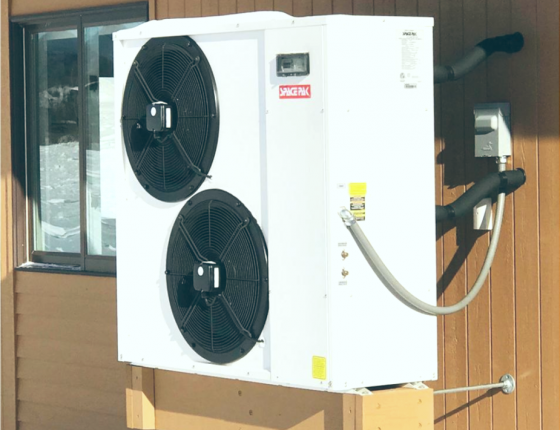Update: February 2024
The project team presented a CARD webinar in December on key project findings — the webinar recording is now available on CEE’s website. The project identified dozens of AWHP models and configurations that are available for a variety of Minnesota residential applications. For systems field-tested in this study, the AWHPs produced 6,300 to 16,600 kWh and $453 to $1,450 savings per year. The project team recommends aligning this subset of ASHP technology with existing ECO models and programs and advocates for standardized ratings for AWHP systems to promote the technology as a flexible and effective heat pump solution.
Update: April 2023
Samantha Hill, CEE research engineer, presented an interim case study on this project at ASHRAE’s 2023 Cold Climate Conference in March. Through continuous power, flow, and temperature monitoring, the project team assessed the operational behavior and calculated system performance efficiencies for each AWHP system in the field study. While coefficient of performances (COPs) above 3 were observed, unaligned control logic between the outdoor compressor unit, indoor distribution unit, and thermostat can quickly reduce the COP by 50% or more. Optimizing system controls could deliver reliable comfort and efficiency gains that will be vital to leverage the remarkable flexibility AWHP systems may offer.
Update: October 2022
The project team has installed four demonstration systems in MN homes. All four systems provide heating and two include the ability to provide air conditioning. In preliminary results, energy outputs have produced as much as three times the energy input. The team is optimizing controls and thermostats and working on other updates to raise the upcoming heating season’s average coefficient of performance. The team also plans to submit a paper on this project for the ASHRAE and SCANVAC HVAC Cold Climate Conference taking place spring 2023 in Anchorage, AK.
Overview
Recent work with heat pump technology has yielded options that are high in efficiency, but also high in cost, like ground source heat pumps (GSHPs), which require a geothermal well. An alternative heat pump technology — the air-to-water heat pump (AWHP), a new variant of an air source heat pump (ASHP) — uses electricity to move heat from outdoor air into indoor water. These systems are compatible with radiant heating, domestic hot water, and forced-air distribution. They offer the potential flexibility and higher efficiency of GSHPs at lower costs that are comparable to air source heat pumps.
This project is a field study of AWHPs to characterize and evaluate their efficiency, performance, and cost-effectiveness. AWHP systems have the potential to play a central role in the future of residential electric heating, which is used in 17% of the homes served by Minnesota’s cooperative and municipal utilities. Field-monitored units are essential to demonstrate their promise in cold-climate applications.
Project Summary
Objective
Assess the energy savings and cost-effectiveness of air-to-water heat pumps for heating, cooling, and domestic hot water, as well as inform utilities and consumers about which system types and configurations are best suited for Minnesota homes.
Scope
- Task 1: Market and technology assessment
- Task 2: Site recruitment and installation
- Task 3: Monitoring and experimentation
- Task 4: Analysis Task 5: Dissemination of findings
Non-energy benefits
- Decreased costs of ownership
- Lower utility bills
- More easily serviceable systems
Additional Resources
